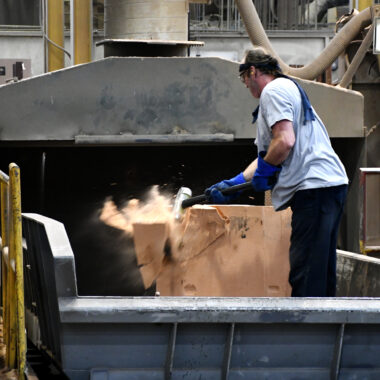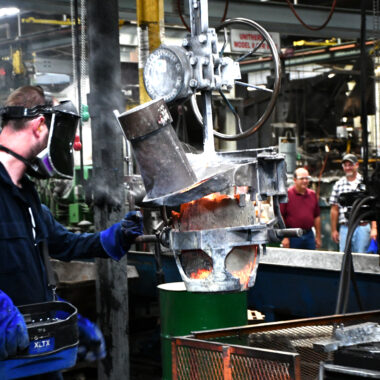Raise Your Craft: Expert Insights into Casting Aluminum
Raise Your Craft: Expert Insights into Casting Aluminum
Blog Article
The Clear-cut Manual on Aluminum Spreading Provider
Within the elaborate globe of light weight aluminum casting services lies a riches of understanding waiting to be explored. As markets remain to demand accuracy and high quality, recognizing the subtleties of light weight aluminum casting processes ends up being critical. From the necessary devices and tools to the critical facet of quality control, every detail plays a significant role in shaping the final outcome. What truly sets an extensive manual apart is its ability to not only give fundamental expertise but also to supply insights right into optimizing performance and efficiency. As we browse with this clear-cut handbook, uncovering sector fads and advancements that form the landscape of light weight aluminum casting solutions, we are reminded of the unlimited possibilities that wait for those prepared to immerse themselves in this complex craft.

Understanding Light Weight Aluminum Spreading Procedures
Discovering the ins and outs of aluminum casting procedures exposes the accuracy and complexity entailed in transforming liquified steel into elaborate components. Light weight aluminum casting is a thorough manufacturing technique that entails the pouring of molten light weight aluminum right into a mold and mildew to develop a desired shape.
During the cooling process, the aluminum takes the shape and strengthens of the mold. What adheres to is careful workmanship to get rid of any type of flaws and fine-tune the part to meet the needed requirements. This process requires an eager eye for information and a deep understanding of metallurgy to make certain the end product's quality and integrity.
Recognizing the subtleties of aluminum casting procedures is critical for producing top quality components that meet sector standards and requirements. From aerospace to automobile industries, the accuracy of light weight aluminum spreading plays a vital role in making trusted and resilient components.
Necessary Tools and Equipment
What tools and tools are indispensable for attaining precision and performance in aluminum spreading processes? To make sure effective light weight aluminum spreading, a number of essential devices and equipment are required. Crucible heaters play a crucial role in thawing the light weight aluminum alloys, supplying the molten metal required for spreading. Crucibles constructed from products like clay graphite or silicon carbide are frequently utilized due to their high heat resistance. Additionally, a ladle is necessary for transferring the liquified steel from the heater to the molds accurately. Air flow systems are vital to eliminate any fumes or gases generated throughout the casting procedure, ensuring a risk-free functioning atmosphere. Molds, made from materials such as sand or steel, are essential to shape the molten metal into the preferred type. Various other devices like tongs, pouring basins, and cooling chambers are additionally important for managing the molten metal and making certain correct solidification. By utilizing these tools and equipment properly, light weight aluminum casting services can attain high accuracy and efficiency in their procedures.
Quality Assurance in Aluminum Casting
Making certain regular top quality standards is paramount in aluminum casting procedures to meet market needs and consumer expectations. Quality control in aluminum casting entails an organized technique to monitoring and evaluating every phase of the spreading process to guarantee the last product's honesty. To attain this, different techniques are used, such as aesthetic inspections, dimensional checks, non-destructive screening, and product evaluation. Aesthetic evaluations are performed to recognize surface area problems like splits, porosity, or incomplete loads. Dimensional checks make sure that the casting satisfies precise specs. Non-destructive testing methods like X-ray, ultrasonic, or color penetrant inspections can identify internal defects without harming the part. Product evaluation through spectroscopy or chemical screening validates the make-up of the aluminum alloy made use of (casting aluminum). By applying rigorous quality assurance steps, light weight aluminum casting service companies can provide elements that adhere to the greatest criteria of top quality, integrity, and efficiency, eventually pleasing both industry laws and consumer demands.

Making Best Use Of Performance and Performance
To improve functional efficiency in light weight aluminum spreading solutions, enhancing effectiveness and performance is important for meeting production needs and maintaining competitive benefit in the market. Implementing lean production concepts, such as decreasing waste and simplifying processes, can dramatically improve total effectiveness. Using sophisticated innovation, like computer-aided style (CAD) software application and automated systems, can enhance efficiency by decreasing manual work and raising precision.

Teaming up carefully with providers to guarantee a stable circulation of top quality materials and carrying out robust scheduling and inventory management systems are additionally key methods for maximizing performance in aluminum spreading services. By concentrating on these areas, business can accomplish greater degrees of efficiency, fulfill client demands properly, and remain in advance in an affordable market.
Industry Trends and Innovations
In feedback to the progressing landscape of aluminum spreading services, staying abreast of try this market fads and innovations is vital for keeping an affordable side and satisfying the vibrant needs of the marketplace. One notable fad in the light weight aluminum spreading market is the raising focus on sustainability and environmental responsibility. Companies are adopting greener techniques, such as utilizing recycled aluminum and applying energy-efficient procedures, to align with consumer expectations and governing needs.
Furthermore, improvements in technology are reinventing light weight aluminum casting processes. The assimilation of automation, robotics, and expert system is simplifying production, improving precision, and decreasing preparations. 3D printing is likewise making waves in the sector by allowing intricate geometries to be created with higher effectiveness and cost-effectiveness.
Furthermore, there is an expanding focus on customization and item customization. With customers looking for special and tailored items, aluminum casting solutions are adjusting to provide even more adaptable manufacturing click here for info remedies. By welcoming these industry fads and advancements, companies can place themselves for success in a rapidly progressing market.
Final Thought
Finally, the manual on light weight aluminum spreading services offers a comprehensive overview of the procedures, tools, quality assurance actions, performance approaches, and sector fads in the field. By understanding these vital elements, services can enhance their casting processes, guarantee top quality items, and use this link stay affordable in the market. This conclusive handbook works as a useful resource for those associated with light weight aluminum casting services.
As sectors continue to demand precision and top quality, understanding the nuances of aluminum spreading processes becomes vital (casting aluminum). Light weight aluminum casting is a thorough manufacturing technique that entails the pouring of liquified aluminum right into a mold to produce a preferred form.Ensuring consistent top quality requirements is extremely important in aluminum spreading procedures to fulfill industry requirements and consumer expectations. Quality control in light weight aluminum spreading includes a methodical method to monitoring and examining every stage of the spreading process to guarantee the last item's integrity.In final thought, the handbook on light weight aluminum spreading solutions supplies a comprehensive summary of the processes, devices, quality control procedures, performance approaches, and market trends in the field
Report this page